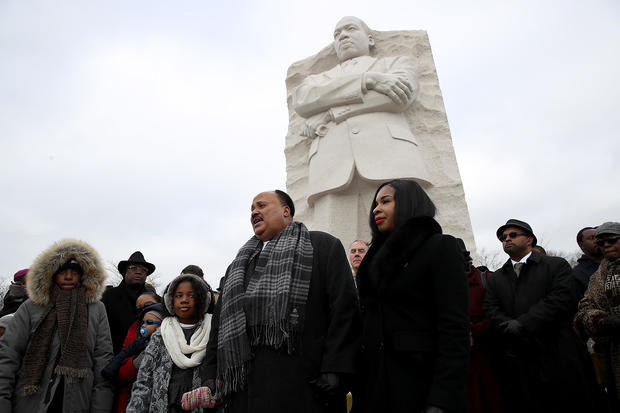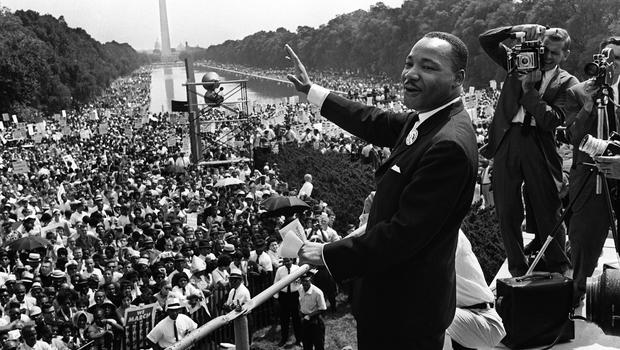M WAQAR..... "A man's ethical behavior should be based effectually on sympathy, education, and social ties; no religious basis is necessary.Man would indeed be in a poor way if he had to be restrained by fear of punishment and hope of reward after death." --Albert Einstein !!! NEWS,ARTICLES,EDITORIALS,MUSIC... Ze chi pe mayeen yum da agha pukhtunistan de.....(Liberal,Progressive,Secular World.)''Secularism is not against religion; it is the message of humanity.'' تل ده وی پثتونستآن
Monday, January 15, 2018
Maxine Waters: If Martin Luther King Jr. were alive, he'd be marching for Trump's impeachment
Martin Luther King Jr. Day marked by pledges to fight racism, Trump criticism
Martin Luther King Jr.'s children and the pastor of an Atlanta church where he preached decried disparaging remarks President Trump is said to have made about African countries, while protests between Haitian immigrants and Trump supporters broke out near the president's Florida resort Monday, the official federal holiday honoring King.

- Down the street from Mr. Trump's Mar-a-Lago retreat in Palm Beach, Florida, on Monday, Haitian protesters and Trump supporters yelled at each other from opposing corners. Trump was staying at the resort for the Martin Luther King Jr. holiday weekend. Video posted by WPEC-TV showed several hundred pro-Haiti demonstrators yelling from one side of the street Monday while waving Haitian flags. The Haitians and their supporters shouted "Our country is not a sh*thole," referring to comments the president reportedly made. Mr. Trump has said that is not the language he used.
US And Pakistan Adversity: A Gateway To Russia – OpEd
By Baber Ali Bhatti
Why is Britain keeping quiet about Pakistan’s assault on free speech?
Jon Boone
The Foreign Office should be protesting about the kidnap and torture of social media activists, not pandering to the generals.
In recent times Pakistani social media activists of a liberal, secular persuasion have been abducted by agents of the state, tortured then released after a few weeks. Invariably they then give up the blogging business: they stop criticising the country’s military establishment, or the militant religious groups long backed by the army as proxy warriors.
Last month saw another abduction of a peace activist in Lahore. A Marxist professor was found dead in Karachi yesterday.
And last week, Taha Siddiqui, an outspoken journalist, narrowly escaped the most brazen kidnap attempt yet. He was roughed up, in broad daylight, by several armed men who had stopped the taxi he was travelling in on a busy Islamabad road. It is beyond any reasonable doubt that his attackers were military personnel. The army had already made clear its annoyance with his outspoken journalism.
Britain has had nothing to say about this growing assault on free speech, even when it involved a journalist who contributes to British media outlets, including this one. But there were no public condemnations. Not even the meekest expression of concern.
Readers of the official Twitter feed of the British High Commission, or the personal feed of Thomas Drew, Britain’s top diplomat in the country, will struggle to find mention of Siddiqui, the bloggers or anything else of substance. They will only see a stream of inane babblings about various public relations initiatives promoting Britain and soft news stories about Pakistan.
Unfortunately for liberal bloggers, despised religious minorities and other disfavoured groups, the Foreign Office has deliberately positioned itself as Pakistan’s cheerleader in chief.
Pakistan, it is thought, is too important to upset. Britain’s spooks particularly prize the intelligence-sharing relationship. All Boris Johnson appeared to want to talk about during his recent visit to Pakistan was a future, post-Brexit trade deal. The British reflex to pander to Pakistan will likely be reinforced by the tough new approach of Donald Trump. The US president has started talking very frankly to Pakistan, demanding it end its decades-long support for the Taliban. For more than 10 years the UK has remained silent about the immense damage Pakistan has done to British efforts in Afghanistan. The UK has preferred to believe the endless promises of successive army chiefs that, this time, things really are going to change. They never do.
At times the UK seems keener to challenge negative international perceptions of Pakistan than the Pakistani government itself. Foreign journalists are presented with a “narrative” of a country on the up. It is not Britain’s job to shill for Pakistan. And it is a highly contestable claim. While terrorist violence is sharply down, it has been achieved in a way that is unlikely to be sustainable: a campaign of illegal abductions and killings rather than root and branch reform of an incapable police and broken judicial system. The business environment remains unreformed, and the country never far from its next economic crisis.
Even if Pakistan had turned a corner Britain should not be blind to the problems that remain, or afraid to raise its concerns publicly. The UK is deeply involved in the guts of Pakistan’s internal affairs. The Department for International Development, for instance, spends more money in Pakistan than anywhere else, and is a key player in reforming the country’s school system.
The concern for education is laudable. But Britain should be equally concerned about a campaign to silence the military’s few critics. It appears to be part of a broader plan to manipulate and undermine democracy that saw prime minister Nawaz Sharif thrown from office on a technicality last year. It is not at all clear whether Pakistan will have elections as scheduled this year. British diplomats actually make the problem worse by conducting diplomacy with army generals in their headquarters in the city of Rawalpindi, further undermining the authority of elected civilians.
The lavish aid programme and the sheer size of the British-Pakistani community means the UK has serious clout in Islamabad. Public disapproval from the UK would impose some cost at least on a deep state running amok. As it is, the Pakistan army has correctly concluded that it can abduct off-message journalists with impunity. A pliant local media did not even need to be told to avoid covering Siddiqui’s abduction. The generals can live with a few bleats of admonishment from international rights organisations.
Pakistan is one of the few country’s where the public displeasure of the British high commissioner might have a useful effect.
#justiceforZainab #Pakistan - OP-ED Who is guilty? The individual or society?
By Dr Ishtiaq Ahmed
We can’t continue to be the proverbial pigeons who can close our eyes and imagine that the predatory cat is not out there. It is, and it is real and ready to pounce on us any time.
Structural change along with therapeutic treatment of odd and unacceptable behaviour of individuals can to a large extent help us bring violent crime such as rape and murder down to a very significant level
Pakistan celebrities break taboo to reveal child sexual abuse
By Memphis Barker
Three prominent women link up with #MeToo movement amid furore over rape and murder of seven-year-old girl.
Three Pakistani celebrities have become the first women in the conservative nation’s history to publicly reveal that they were sexually abused as children, amid a national furore over the rape and murder of a seven-year-old girl.
The actor Nadia Jamil, designer Maheen Khan, and PR guru Frieha Altaf shared their stories on social media.
Jamil told her 100,000 Twitter followers on Saturday that “I was 4 the first time I was abused sexually”.
“People tell me not to talk to respect my family’s honour,” she added. “But is my family’s honour packed in my body? I am a proud strong, loving, survivor. No shame on me or my kids.”
Khan, who embroidered the costumes in Snow White and the Huntsman (2012), said that the mullah who came to teach her the Qur’an “abused me sexually. I froze in fear day after day.”
On Sunday, Altaf posted: “I was sexually abused by our cook at age six … the only shame is keeping SILENT.”
The revelations come as police in the city of Kasur hunt for the killer of seven-year-old Zainab Ansari. DNA analysis suggests the suspect may be responsible for the murder up to 11 other children within the same two-mile radius in the past year, a spate of killings that has prompted large protests and allegations of police neglect.
On Twitter, the celebrities used the hashtag #justiceforZainab. They also appended #MeToo, linking their stories with the international fightback against abusers sparked by the Harvey Weinstein scandal.
“It’s a first and a wonderful point that has been made,” said Manizeh Bano, the executive director of Sahil, an anti-child abuse charity. She hoped other survivors would be encouraged to come forward by powerful women breaking the national taboo against open discussion of sexual matters.
Pakistan ranks as the world’s fourth least hospitable country for women and has a legal age of consent of 12.
All the women have received supportive messages on social media.
“Since yesterday I have had 20 people call me and talk to me about their own instances,” Altaf told the Guardian.
“This topic has been festering for a long time,” added Khan, saying that she hopes the state will bring in capital punishment for abusers, since “if the child has not died, she is still not alive anymore for the rest of her life”.
Sexual education is absent from Pakistan’s national curriculum, and even broaching the subject is liable to provoke the country’s religious right wing.
Responding to the Zainab case, Hafiz Hamdullah, a senator for the Islamist party Jamiat Ulema-e Islam, said if “the western version of sex education [is] allowed in schools … it will aggravate the situation even more”.
Verses in the Qur’an that detail the process of conception are typically ignored by mullahs and left out of translations from Arabic, notes Sahil’s Bano.
Yet activists and government officials believe that the soul-searching over the Zainab case could at least pave the way for classes informing children on how to protect themselves from abusers. The information minister, Marriyum Aurangzeb, spoke in favour of such lessons in parliament.
Nevertheless, the options available to those who have been abused leave much to be desired. Pakistan lacks child-friendly or women-friendly courts, meaning few dare to come forward. Meanwhile a law that requires the state to pay for abused children’s legal aid has still not been implemented.
#JusticeForZainab - زینب واقعے سے جگ ہنسائی ہوئی، بچوں کا تحفظ قومی مسئلہ ہے: بلاول بھٹو
Our police system is obsolete, needs reforms: Bilawal Bhutto
Chairperson Pakistan People’s Party Bilawal Bhutto said that the police system in our country has gone obsolete and it needs to be reformed.
He was addressing a press conference here on Monday.
Bilawal Bhutto said that awareness and education are very important to fight the menace of child abuse.
“We cannot fight child abuse if our children don't know how to protect themselves," he said. "All political parties should gather at one platform for protect the child rights."
He said that the Sindh government is taking all out efforts to introduce an education curriculum based on skills for the children in the province.
Bilawal said that the life skills-based education curriculum has been adopted at Fatima Jinnah Government School and it showed positive results.
He said the Sindh government would implement similar curriculum in 200 schools across the province.
The PPP chairperson said that children should know how to protect themselves, their health and their body.
He also said that he was not satisfied with the police system and proper changes should be made for an accountable police.
#ZainabZindaHai - Bilawal stresses awareness to combat child abuse
Bilawal Bhutto - Sindh Govt is taking all necessary steps to adopt life skills-based education in curriculum across province.
Sindh Govt is taking all necessary steps to adopt life skills-based education in curriculum across province. We can't fight child abuse if our children don’t know how to protect themselves. All political parties should be on same page pertaining to child rights: @BBhuttoZardari pic.twitter.com/fC4S8rtmEH
— PPP (@MediaCellPPP) January 15, 2018










